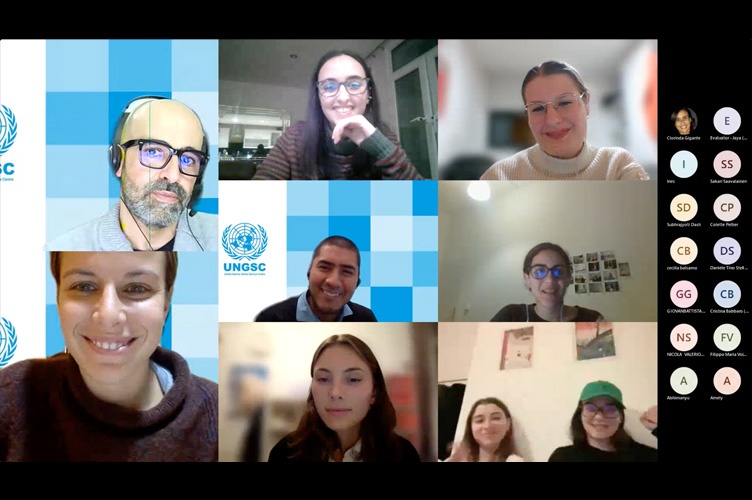A Closer Look at their Environmental Strategy for Field Missions and Efforts to Improve the Sustainability of Global Peacekeeping Operations
In December 2022, GEA Sustainability ESCP hosted a team from the United Nations Global Service Centre (UNGSC) for a compelling discussion surrounding the environmental strategy and sustainability considerations employed in UN peacekeeping operations.
Joining ESCP students and staff virtually from the UNGSC base in Brindisi, Italy, Carlo Perrucci, Alonso Torres, and Sofia Rossi shared their experience from working in the Environmental Technical Support Unit (ETSU) at UNGSC, an operational arm of the UN Department of Operational Support (DOS). The team provides technical assistance to field missions in regard to energy, water and wastewater, and solid waste management.
During the presentation, the team introduced the DOS Environmental Strategy, walking us through its technical pillars and operational objectives. Both the structure and goals of the strategy promote the following five ambitions: consume less and cleaner energy, minimise and safely manage waste, optimise water and wastewater use, incorporate an environmental management system to enhance performance, and finally, as emphasised by Perrucci, “decrease, as much as possible, our footprint and leave behind a positive legacy.” Pursuing these targets, the ETSU has successfully coordinated and provided on-ground technical assistance to seventeen UN missions worldwide since the implementation of the new strategy in 2017.
What is meant by “technical assistance,” exactly? While supporting missions may mean deploying personnel abroad, it primarily entails communicating with colleagues already present at the site on a daily basis, providing documentation and guidance when needed, to ensure missions’ operations meet UN environmental obligations.
Currently, the ETSU focuses its support efforts on two key areas: increasing the penetration of renewable energies and energy infrastructure, and leaving a positive legacy. The ETSU team assesses several missions in reducing the footprint of their energy consumption by upgrading to more efficient HVAC systems, for example, and installing photovoltaic solar systems for clean, decentralised electricity production. Additionally, the team helps missions to reduce and better manage their waste, for example by promoting the use of refillable water bottles over single-use plastic bottles, establishing centralised waste management ‘yards’ where waste can easily be sorted and recycled or disposed of properly.
![DOS Environmental Strategy Key Performance Indicators [2017–2021]](/sites/default/files/inline-images/UNGSC%20Strategic%20KPIs%20Table.png)
The Strategic KPIs table presented above quantifies the impact of the ETSU’s technical assistance across the pillars of the DOS Environmental Strategy since its outset. From 2017 until 2021, the results show a 37% increase in the number of sites where wastewater was assessed as posing a minimum risk to personnel and local communities. This is an impressive achievement in such a short time span. In regard to solid waste management, the share of waste with preferred disposal methods increased from 20% in 2017/18 to 43% in 2020/21, indicating a significant improvement in the sorting and appropriate disposal of solid waste (i.e. by composting or incineration). In regard to energy, a reduction of 0.56 L/cap/d was recorded from 2017/18 to 2020/21. Accompanied by an increase in the proportion of renewable energy from 3% to 5% over the same period, it is safe to say that field missions are on their way to enabling a more efficient and sustainable energy future.
The ETSU team is also committed to the guidelines set forth in the UNGSC Environmental Policy. This policy demands the UNGSC adopt a more holistic approach to sustainability, incorporating lifecycle assessment principles into its goods sourcing, for example: asking where a tool or technology will go after it serves its purpose for the mission is a question that must be asked before purchasing, rather than after. In addition, the ETSU team engages in capacity building, or the training of new colleagues in the field. Outside of the policy obligations, the ETSU engages local stakeholders in Brindisi through awareness campaigns, educating people on how to “use water wisely,” be “energy-smart” and “leave no waste behind.”
Looking to the future, the ETSU team will largely be focused on supporting the increase of renewable energy generation where field missions operate, enabling energy independence and security amid times of climate change uncertainty and economic instability. Furthermore, the UNGSC and DOS are building partnerships with UN member states, financial institutions, and NGOs to attract increased private investment in the communities in which they are present, boosting the local economy and improving quality of life until the UN’s assistance is no longer needed.
Concluding Remarks
GEA would like to extend a big thank you to Carlo Perrucci, Alonso Torres, and Sofia Rossi of UNGSC Brindisi for taking the time to speak with ESCP Business School’s students and staff, sharing how the Environmental Technical Support Unit (ETSU) helps to minimise the environmental impact of UN field missions and global peacekeeping operations.
If you are a student interested in pursuing a career with the United Nations, Sofia Rossi recommends you join the UN Junior Professional Officer (JPO) Programme. Rossi is currently a JPO in environmental engineering at UNGSC Brindisi and highly recommends the hands-on experience focused on supporting the United Nations’ 2030 Agenda for Sustainable Development and achieving its 17 Sustainable Development Goals.
Find out more about ESCP Student Societies at ESCP London Campus
Article by Benjamin Tremblay
Campuses
